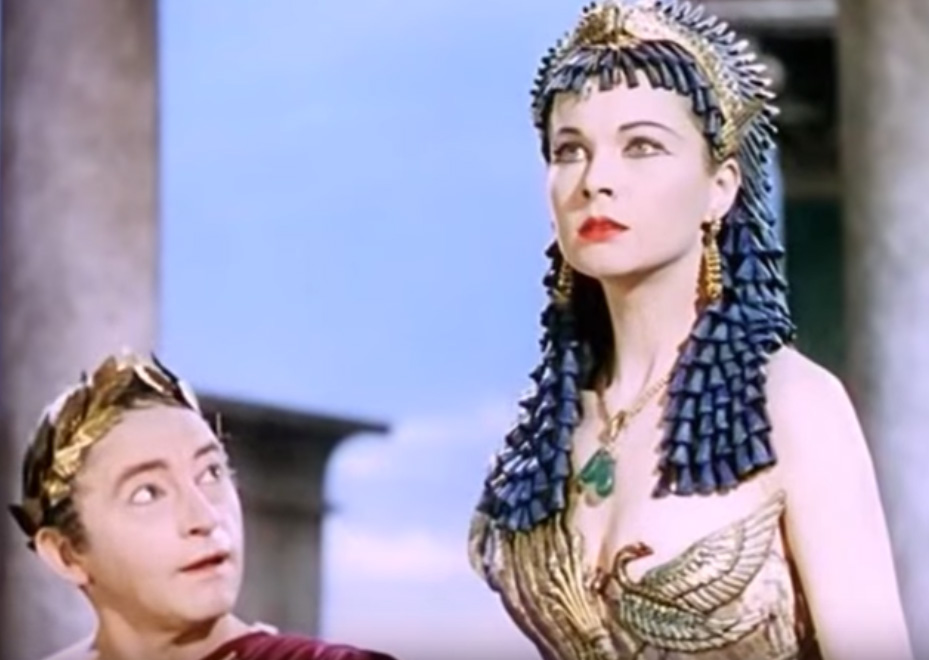I knew nothing about this film. Perhaps a photo of actress Vivien Leigh once long ago. I watched it because of her. I was watching a short documentary about her, and it referred to a specific scene that changed both the character and, unfortunately, the actress herself.
The other star of the film is Claude Rains whom I know nothing about other than his name. He plays the Roman Emperor Julius Caesar, apparently on a mission to conquer Egypt.
One night, the 50-ish Caesar arrives at the city of Ptolemy XII, who according to the story had not been a great ruler, and was only put back into power by a Roman soldier, Mark Antony. The people of Ptolemy’s city, Alexandria, are panicked by the impending arrival of Caesar’s Roman army. Caesar arrives before his troops, though. He is left alone in the night at the foot of a Sphinx, speaking to it in reflection as one might to a god. A young girl interrupts Caesar. She is small and childish, almost coquetish but naive. She doesn’t recognize him in the dark as being a Roman, whom she fears as monster-like in looks and behavior; and she explains that she is the queen of Egypt. He can’t believe her to be anything but a playful child, though he is smitten with her beauty.
She takes him into the hall of the Pharaoh and he realizes she is telling him the truth. She acts like a child mostly, powerless and completely unsuited to be the queen of anything. Cleopatra tells the Roman about her father and how she longed to again see the handsome Roman soldier, Mark Antony. She is chastised by a governess of sorts, Ftatateeta (Flora Robinson) for bringing a strange man into the palace. Caesar tells Cleopatra to act like the queen she is and to get control of her servants. By the end of the scene, Caesar is controlling the entire situation, Ftatateeta flees less she be beaten by Cleopatra or beheaded by another black, male servant at Caesar’s request. Cleopatra cannot catch her, so she beats the male servant instead, so that she can feel like a queen.
More panic arises as the Roman troops approach, and she is forced by the Roman and Ftatateeta to dress in her royal garb and to stand her ground and exert her influence in front of Caesar and his army. She is frightened, though, and full of panic as most everyone has fled the palace already. Her eyes dart back and forth as she tries to decide whether to obey or flee. The soldier march up to the throne and shout, “Hail Caesar.” After repeated hails, she realizes, they are all saluting the aging Roman man who’d been advising her. He is Caesar, and she collapses in his lap relieved.
The stage sets of this movie are really well done, quite large. I cannot imagine what the budget was. There are a lot of fleeing Egyptians in one scene, and a well-done special effect is used to convey the large fire of a burning fleet. The costumes tend to be really well done, too. Cleopatra’s beaded wig is simply beautiful.

The heredity of Cleopatra may be up for some historical debate. But it’s hard to ignore the fact that a lot of European white actors are portraying Egyptians in this film. There are black actors playing other slaves or servants. And seeing white (I mean, super-duper white) Vivien Leigh beating a dark-skinned slave is rather jarring, to be honest. But her character does it with such entitled glee that it’s almost comical how much devotion the girl-queen lacks for those around her. Flora Robinson is clearly wearing brown makeup and a frizzy wig to make her appear African or Middle Eastern of some sort; and while this is possibly disappointing to view, it seems to have been standard operating procedure for many filmmakers of the time.
The entire production seems like an expensive play. And reportedly, it was originally a stage production written by George Bernard Shaw in 1898 (nearly 50 years before this film version). In that context, it might be forgivable to have a small cast of local actors portraying a wide array of ethnicities. So, for the era, it may be difficult to completely contextualize what we are seeing on the screen with our more modern sensibilities. I’ll leave that to your own valid opinions and interpretations.
The plot continues with political intrigue. We come to find out that Cleopatra is already married — to her younger brother, Ptolemy XIII, a spoiled brat who does not want his sister to have claim to the throne at all. He has a hefty political adviser, Ponthinus (Francis L Sullivan), who tries to get his fellow Egyptians to rise up against Caesar. But when the moment of confrontation occurs, Caesar again takes control of the situation and decides that Cleopatra and her brother should be joint rulers; but he still retains controls what happens there, and informs Ponthinus that he has been collecting taxes so that he can have his share of the riches.
There is a conflict brewing between the Romans and rebelling Egyptians at a lighthouse across the harbor. Caesar goes there, and Cleopatra tries to follow him. But she is forbidden to do so. She turns to a tall, strapping fella named Apolodorus (Stewart Granger). She comes up with a scheme to have herself rolled into a carpet and have this carpet presented to Caesar as a gift of the queen, so that she can circumvent the guards that are blocking her. This scene is played for comic relief, and it is amusing. The next part is the unrolling of the queen in front of Caesar and his advisers. He is happy to see her, but the lighthouse is being overrun. So, instead of staying to fight, they flee by jumping into the harbor. This is kind of a shocking scene because the leap into the water is quite high. Caesar excitedly tries to prove his youthfulness by disrobing and diving head first in so that he can swim to an awaiting boat. The remaining advisers pick Cleopatra up and throw her into the water. The way it is filmed, it looks like she barely clears the solid land — quite dangerous for the stunt person, I’m sure .
Cleopatra learns a lot from Caesar over time and becomes more mature and hardened. Eventually, she plots against him and tells Ponthinus of her plan. He goes to tell Caesar, but is interrupted by Cleopatra. He tells Caesar of her plot, and Caesar surprises Ponthinus with a response that this kind of outcome would be entirely expected of a ruler. Caesar allows Ponthinus to leave, but Cleopatra secretly bids Ftatateeta to murder Ponthinus. She follows the politician and stabs him to death.
Caesar is greatly disturbed by this event. He sees Ftatateeta acting strangely and praying to the statue of a god, likely for forgiveness. Cleopatra approaches her and rewards her with jewelry. This is a wonderful scene because you expect Cleopatra to deny the murder. And at first she does. But then she tries to take command of the situation and reveal that she made the decision as a ruler should. And yet, she ends up being cut down to size for going behind Caesar’s orders and making a rash decision. He points out how terribly foolish and short-sighted it has been due to Ponthinus’ popularity with the Egyptian people. Humiliated and ignored by all of the men around her, Cleopatra foolishly insinuates to Caesar’s officer Rufio that her murderous order were not the working of a man. Rufio kills Ftatateeta and Cleopatra finds her body.
An uprising ensues, and Caesar goes to battle with the the forces of Cleopatra’s brother, Ptolemy (who apparently drowned by a sinking barge). Caesar returns, victorious, and to much adoration. He says he will return to Rome, and appoints Rufio to be the Governor of Alexandria. Caesar says goodbye to his other advisers and says he must have forgotten something. It’s not clear if he is joking or honestly saying he has forgotten about Cleopatra. But she arrives in a drab gray mourning dress. She says she is not mourning Caesar’s leaving, nor her brother’s death, but rather Rufio’s servant Ftatateeta. Caesar congratulates Rufio on his decision to “kill the tiger” that might have turned on Caesar. But then appologizes for the death of “Totateeta” — this misporonunciation makes Cleopatra laugh and it breaks the dour tension she tries to convey. Caesar promises to comfort her with a gift. He will send Mark Antony to Egypt to visit her. She squeals with glee, and Caesar takes his leave saying, “I do not think we shall meet again.”
The film is not as grand as some other big-budget productions of that era. Certainly, Vivien Leigh’s earlier and most famous film, Gone With the Wind, would not be outdone for many years to come. Leigh’s performance in both films coveys similar characters — young, impetuous girls of privileged upbringing, dealing dismissively with slaves, the dangers of war, falling in love with a man whom she ultimately does not need, and transforming from teenager to womanhood. The final scene where she acts girlish sort of betrays that transformation. And her giggling after the death of her trusted servant/caretaker Ftatateeta might be the most disturbing moment of the film. Does she actually care about anything or anybody?
The documentary that led me to watch this film, claimed that Leigh tripped and fell while running through the palace in one scene. And that caused her to have a miscarriage in real life. And because of that, the doc explained, her disposition changed. It was said that she suffered from bouts of bipolar mania and depression throughout her life, and she also had recurrent tuberculosis. The say her personal loss and demeanor emphasized the seriousness of her scenes as the older Cleopatra. Her scheming and manipulative behavior in the last 1/4th of the film is among the best aspects as you can indeed see she has become a force to be reckoned with, not to be trusted.
Caesar is not portrayed in a negative light in this film. He goes around killing the forces that oppose Roman expansion, but he also seems to want to let his powerful adversaries go free. He is a man of diplomacy and strength, and much admiration — a grandfatherly figure who knows better than anyone else, whose wisdom cannot be understood. Throughout the film, he is accompanied by an adviser who is a Britain, essentially a slave. The victorious Caesar is about to set him free, but the Britain claims that it is in his service to Caesar that he has found freedom. It comes across as incredibly odd thing to say. Perhaps he figured he would have no life if he left — I don’t know. Caesar’s self-assuredness is conveyed only interrupted by his early adoration of the teenage girl, and later by her assassination order; but the Emperor’s own overextended ambition and later self-appointment as a god is not hinted at here. You would think, from this presentation, that only Caesar’s foreign enemies would want to harm here, not his fellow Romans.
The film is all right. Not spectacular. Worth watching if you enjoy Vivien Leigh. I do not know about the accuracy of the film.


